- Home
- Marge Piercy
Storm Tide Page 5
Storm Tide Read online
Page 5
“Who is that?” Judith asked.
Yirina’s face crumpled. “Don’t ask me that.”
She wondered if somewhere in Turkey she had a half brother. Her half sisters were both married with children. They pretended she did not exist, but now they knew. They could not undo her existence or their knowledge of her. For that she was grateful. Neither of them had amounted to anything, as Yirina said. “But you, my daughter, you’ll be a success! Not just a suburban house biddy.”
It was the end of spring vacation and she longed to stay over at Mark’s. At ten she called Yirina. There was no answer. She knew Yirina would not be going out. She was too exhausted after work. Judith was afraid her mother had been mugged. Something was wrong. She must go home. “But you can’t go! You promised!” Mark insisted, pouting.
“I have to see what’s wrong.”
When she finally reached the apartment, the lights were on. She called Yirina, hurrying through the rooms. Her mother’s purse was on the couch. Yirina lay on the bathroom floor, her face twisted, breathing hoarsely. She was unconscious. Judith could not tell if she had hit her head. She knelt over Yirina, wiping her face with a damp cloth and calling, “Mama! Yirina! Can you hear me?” Judith called an ambulance. It took half an hour to arrive. Ambulance services did not like to go into Black neighborhoods.
Yirina had suffered a massive stroke. In four days, she was dead. Judith hated sleeping in the apartment. She was depressed, lonely, given to weeping half the night. Everything reminded her of her mother, every dish, every chair, the bottles of scent and lotion on Yirina’s vanity. They had never been separated. She wandered their rooms, no longer at home in a place that meant only deprivation.
A month later, over the protests of his parents, Mark and Judith were married. Only his roommates and two of her friends from school attended. They could not find a rabbi who would marry them over his parents’ objections, so they were married at City Hall. Mark did not want to move to Brooklyn. They found an apartment three blocks from where he’d been living, similar in layout, a bedroom, a bathroom, a big kitchen and a tiny room overlooking the street that became Mark’s study. She studied in the kitchen. She brought her desk from Brooklyn, along with the things of Yirina’s that were precious to her: a teapot with marvelous curlicue blue and white designs on it, the Mexican vases, some pieces of jewelry (the diamond necklace was long since permanently pawned), some fine Czech glassware. Within a month those were broken. She could not keep Mark from using the goblets for beer and then leaving them in the sink, where other dishes inevitably ended up on top of them. She started out keeping house with zeal, studying recipes, scrubbing the floor, making curtains.
That Friday she roasted a chicken with carrots and potatoes. Mark did not come home when she expected him. An hour later she gave up. Weeping quietly, she lit the Shabbat candles and sat down to supper. When he came in at nine, she was furious.
“Well, who asked you to make a stupid fancy supper? I had a hamburger at the Cedars with guys from my class. Jeez, what is this stuff? We aren’t living in Fairlawn. What’s got into you? Who needs all this bourgeois fussing?”
She did not do well on her midterms. That frightened her. She stopped cleaning daily and then stopped cleaning weekly. The dirty clothes piled up and the dirty dishes began to swarm with roaches. She studied at the library. Now that she wasn’t trying to keep house, she had time. Mark expected her to be there when he got home, and he expected to have sex with her. Weekends they went to movies, danced in a bar, bicycled in Central Park. They went to a lecture on the constitutional implications of Watergate; she went alone to hear Gloria Steinem. She worked for her professor whenever he wanted her to type papers. Their lives went on as before they were married, except that they fought more. She got her grades back up by finals and finished well. She admitted to herself she was bitterly lonely without Yirina, and that Mark did not make an adequate replacement for her mother. He was a kid, as Yirina had warned her. She did not feel married. He was not her image of a husband. She had never had a father, but she had many fantasies. They were not fulfilled by an adolescent whose idea of a great evening was watching a Knicks game in a bar while eating potato chips or nachos and drinking beer.
They both got summer jobs in New York and went on living in their dirty apartment. In the fall, they were seniors with a full load of classes. They ate most meals in the school cafeteria or in hangouts around the Village. She could not remember why she had married Mark; she was sure he had no clue why he had married her. She felt ashamed. When she met some women who were meeting for consciousness-raising, she joined them every Wednesday night. It was a month before she confessed she was married. She felt it was a fake marriage, a failed improvisation, each of them playing in different stories. His parents finally had them to dinner, but it was painful. Mark disappeared with his brother after supper. She was left to make conversation.
She had never told Mark about her family; she had given him the official story, and by the time they were married, it was too late to tell him the truth. She felt her face turning to brittle lacquer as she answered his mother’s questions about her dead father. It was hard to explain why her father had not left her mother better off, considering he was a doctor; she invented an unscrupulous uncle who had obliterated their inheritance in bad investments. Whatever she said sounded hollow to her, and relieved none of their anxieties. She could not cough up a normal family for them. She sat on the beige sofa balancing a cup and a china plate with a slice of cherry cheesecake on it and lied and lied. Finally, unable to eat and half nauseous, she dropped the cheesecake into her lap.
Without telling Mark, she applied to law schools. She went to see Mr. Vetter. He kept repeating how bad he felt about Yirina’s death. “She was a lovely woman, an old-fashioned woman. They don’t make them like that anymore.” For the five years he had his affair with Yirina, he had helped financially. He had been far more generous than Dr. Silver.
“Will my father’s trust cover graduate school?”
“The way it’s set up, it should. The investments yield a good return. Why do you want to go to graduate school? You’re married now.”
“I don’t know if that’s going to last,” she said frankly. Mr. Vetter was the first person outside her family to understand her situation, and she was always truthful with him—it was a pleasure. “I want to be a lawyer.”
“I suppose you could practice domestic law,” he said doubtfully. “Some women do well with that. Or estates and trusts.”
“I’ve wanted to be a lawyer since the first time I came to this office—do you remember?”
He grimaced. “How could I forget such high drama? Well, you have an orderly mind and you’re argumentative. Perhaps you can do research or title searches. Divorce law is untidy, but it can be lucrative …. Where have you applied? And does your husband know?”
“We haven’t discussed life after graduation.”
She was accepted to three law schools. The money from the trust would cover only tuition and some expenses. Then, finally, a letter came from Michigan, offering her a scholarship that made the deal sweet. Mark was interviewing with corporations. She was almost terrified. She could go to law school. She could do what she wanted if she dared. If she could admit she had been an idiot and married someone with whom she could share little.
She precipitated the final confrontation by leaving her correspondence with Michigan on the kitchen table when she went off to school. She knew he would see it when he drank his coffee and ate his muffin.
“You bitch!” he screamed when she came home at four. He had cut his late afternoon class to confront her. She refused to be baited. She had done her crying. “You used me!”
“How?” she asked. But he was probably right. She had been lonely and he wanted to screw her. He paid the rent. “I would have made you a good wife if you’d really wanted a wife.”
He calmed down by suppertime and they went out to share an Italian meal. “It was a stupid t
hing to get married,” he said. “I’m never doing it again.”
“Sure you will. But in a few years, when you really want a home and family.”
“Do you think you’ll ever get married again?” He studied her face and her hands on the table.
She did not want to hurt his feelings further. “I don’t know,” she said. “I can’t imagine it.”
“You really going to be some shyster?”
“I shall fight for the right and the underdog,” she said, and got a smile out of him. For a moment they almost liked each other.
That night they had sex as usual. She did not want to, but far more, she did not want to make a scene. She just wanted to detach, quietly. In her head she was figuring out her finances.
There was no property, no alimony, no children, nothing but a few books and records to divide. Mark took his clothes and ski equipment; she packed up her surviving mementos from Yirina. Awkwardly they stepped around each other. He was off to a job in New Jersey. She was bound for Ann Arbor to look for an apartment and a summer job. In the midst of their boxes and trash, they shook hands politely.
She went down the steps first. One of her friends from the women’s group was going to store her things until she found a place. She would sleep on her friend’s couch tonight and leave for Detroit by bus.
She had to return for the divorce, but it was hardly worth bus fare. Mr. Vetter had arranged for an inexpensive lawyer to file her papers. It was over in ten minutes. She took back her maiden name. The divorce left her feeling vaguely unclean. She seemed no more likely to be a wife permanently than her mother had been. Her marriage was a pile of dirty dishes she had fled.
DAVID
The chief of police salted his fries, knocking the bottom of the white plastic shaker against the heel of his hand. He ate more than any man his size I’d ever known. You were more likely to find Abel Smalley at the Binnacle Cafe than in his office, and in a better mood as well. He spread tartar sauce on a fried fish and melted cheddar sandwich, dropped two pats of butter in his corn chowder and shook his head with a soft but regretful smile, “That’s a Department of Roads, Bridges and Waterways issue.”
“It’s an issue of safety,” I said. “The assholes plowed all the snow to the corner and left it there in a mountain ten feet high. My mother can’t see around it to leave her driveway until she’s in the middle of the street.”
Despite the trend in small communities to recruit professionals, Abel was Saltash’s first and only chief of police, for decades our only full-time cop. He knew everyone’s bad habits and every teenager by name. It was Abel’s strategy to ignore trouble until it was impossible, then cover the dirt like a cat. Not too deep, they said about Abel. Just so it didn’t smell. “Why not call Donkey Sparks about it?”
“He doesn’t return my calls. Chief, you know how fast cars take that corner. Especially now, when it’s icy.”
He was strong and wiry, no taller than five-eight. His white hair stood up like a bristle brush and his gaze was hard, the clear ice blue of a menthol cough drop. He didn’t wear a uniform or a firearm and rarely took a case to court. Years ago, when the local lumberyard caught fire, Abel paid a call on the last worker laid off. No investigation ensued, no charges were filed. The young man enlisted in the army the following week. When Abel received complaints about a gang of kids smoking pot on the town green, he slowly crossed Main Street and invited them to lunch at this same window table. He treated them all to burgers and made his position plain: There were twelve thousand acres in Saltash, and they’d be wise to party on one that wasn’t in front of Town Hall. “You plow snow yourself,” he said. “Why don’t you just remove it?”
“I’m not paid to plow for the town.” I had signed up but I’d never been called.
So that was it. When Abel smiled, his eyes narrowed to slits, straight as a ruler. Two years ago a homeless family was discovered squatting in a large vacation home in the woods. The local newspaper carried it as a headline story: CITY PROBLEMS IN SMALL TOWN. A neighbor sent a copy to the owner of the home, a psychiatrist from New Haven, who faxed Abel he’d be up to survey the damage and press charges. By the time he arrived, the homeless family was gone. No one could say where, except the town accountant, who quietly processed a bill for five Greyhound bus tickets to Atlanta, under police budget line item number 762000, Travel/Seminars & Training. If Abel could, he’d put me on a bus. He asked, “You call the town manager?”
“Twice.”
“And?”
“And I wouldn’t be wasting your time if I wasn’t worried about my mother being blindsided one night when she leaves to rehearse the choir.”
“I’ll drive by this afternoon.” He unwrapped a fresh package of Lucky Strikes. “But I’m the wrong person to see.” The right person was Johnny Lynch, who’d appointed Abel and every other department head in Saltash. Johnny liked my mother and would probably help if she asked, but he’d been in Florida since his last heart attack. “You gotta go through channels. That’s the way things work in this town.”
“Thanks, Chief. I know very well how things work in this town.”
The Saltash Committee for Civic Responsibility met around a glass-topped liquor cart every other Wednesday night in the parlor of a white Victorian captain’s house overlooking the harbor. Twelve regulars, old New Deal Democrats, most approaching eighty, dozed off with drinks in their hands but woke up sputtering fury at the mention of Johnny Lynch. They talked about the need for young blood and looked me over like a steak. They reminded me they made generous campaign contributions and were good for 250 votes. Judith called them the Alter Kockers Against Johnny.
“Old cocks?”
“Didn’t your parents speak Yiddish? Old shits.”
Judith and I had our own line about most groups in town, and nicknames (should I decide to run) for my potential opponents: Blossom End-Rot, Bird Man, Captain Ahab. We met when we could after work, after dark, and the mere sound of tires on my oyster shell driveway, like the tip of her tongue on my nipple, gave me goose bumps. The first time she came over, she stayed the night. There was a new moon tide the next morning that would have kept her from getting to court if she returned to the island. I stopped her in the hallway and kissed her eyes, her lips, her fingers. She whispered, “David, David, David,” her cheek against my chest, then took a step back and requested a hanger for her coat.
She walked though the living room, then the kitchen, disappointed. “You haven’t made supper?”
It was past eight o’clock. I’d had a sandwich after work. “I can’t cook.”
“You can’t fry an egg?”
“Is that what you want right now? An egg?”
“With a little Parmesan cheese, fresh bread and a decent red wine, why not—as long as you don’t burn it.”
So saying, she lugged a shopping bag to the kitchen. A bottle of wine. Fresh bread. Parmesan cheese. “You have eggs, don’t you?” (I did.) Apricot preserves. Olive oil. Coffee.
“You didn’t think I had coffee?”
In weeks to come she’d arrive with casseroles from home, flower bouquets, a reading lamp, fragrant soaps. Beginning with that first night’s coat hanger, she commandeered half my hall closet and a dresser drawer for her underthings. She opened the wine with her own corkscrew—the truth is, I was a beer drinker and didn’t have one—pulled a wire whisk from the bottom of the bag and started an omelet.
“Not talking?” she said over her shoulder. “What was your day like? What did you do?”
As far as I was concerned we could talk on the telephone but had a very small window of time when she didn’t have to go home to her husband, prepare for court, or beat the tide over the bridge back to Squeer Island. I missed her and I wanted to touch her, and I suppose I was hurt that she didn’t want me. She didn’t say a word as she ate, just watched me as if amused and waited me out.
“I met somebody in the post office who wanted to know my position on school taxes. I don’t think she was ple
ased.”
“Why? What did you say?”
“I told her what I thought.”
“Wrong. You’re supposed to ask her what she thinks.” Judith cut a slice of bread then dipped it in olive oil and cheese. “You want to leave people with the opinion that you both think the same way.”
“Maybe we don’t.”
“You want the best education for the fairest price, right? Same as the woman in the post office, same as everybody. Just ask her how she believes you can go from here to there.” She drew an arrow on my tabletop in bread crumbs. “Nod a lot. Tell her you hear what she’s saying.”
“Isn’t that deceptive?”
“Not if you’re listening.”
“Judith. I’m not sure about this. I’m no politician.”
“That’s your strong point. Stand up.” She did. “Let’s practice.”
“Where are you going?”
She dropped her plate in the sink. “To get my mail.”
“What do I do?”
“Come up and ask me for my vote.”
“Get serious.”
“Then I won’t vote for you. What are you waiting for? Stand up! I’m going to leave you behind with the junk mail. I don’t have all day.”
“Hello. I’m David Greene.”
“Mmmm.” A tip of tongue peaked through her lips.
“What does that mean?”
“I’m summing you up. Most women will.” She cocked her head. “Honest face. Great shoulders. Very intense eyes. I’m listening.”
“Can I have your vote?”
“Just like that? Don’t you know women like to talk for a while first?”
“Well, ma’am. I’ve been thinking that things have been the same around here for a long time. I was thinking you might be ready for some new blood.”
“I like that. Very visceral.”

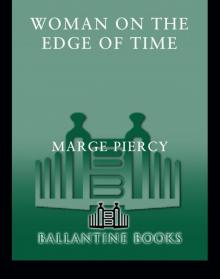 Woman on the Edge of Time
Woman on the Edge of Time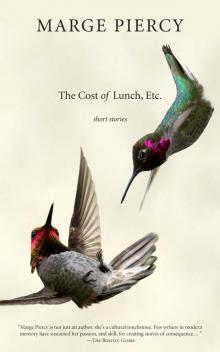 The Cost of Lunch, Etc.: Short Stories
The Cost of Lunch, Etc.: Short Stories Made in Detroit: Poems
Made in Detroit: Poems Sleeping With Cats
Sleeping With Cats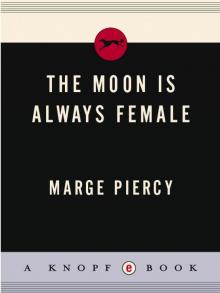 Moon Is Always Female
Moon Is Always Female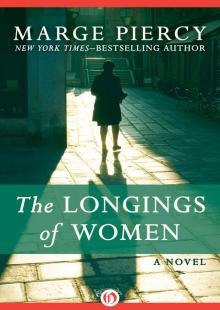 The Longings of Women
The Longings of Women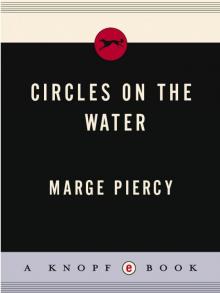 Circles on the Water
Circles on the Water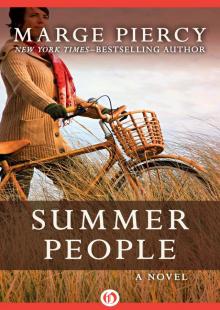 Summer People
Summer People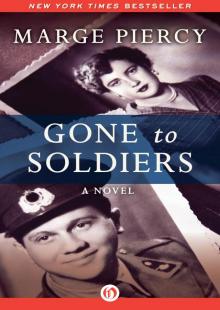 Gone to Soldiers: A Novel
Gone to Soldiers: A Novel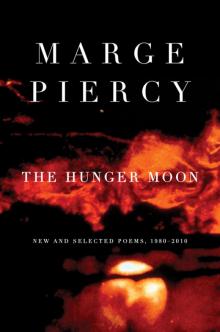 The Hunger Moon: New and Selected Poems, 1980-2010
The Hunger Moon: New and Selected Poems, 1980-2010 Vida
Vida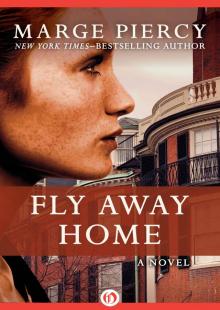 Fly Away Home
Fly Away Home He, She and It
He, She and It So You Want to Write
So You Want to Write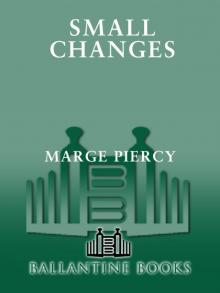 Small Changes
Small Changes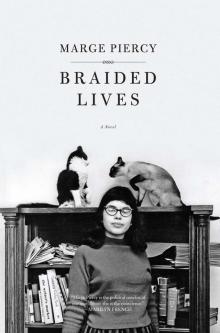 Braided Lives
Braided Lives Lord Valentine's Castle
Lord Valentine's Castle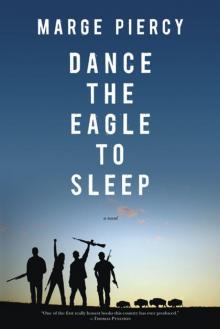 Dance the Eagle to Sleep
Dance the Eagle to Sleep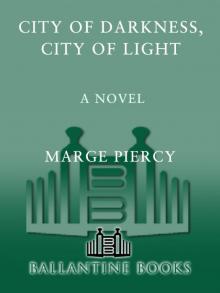 City of Darkness, City of Light
City of Darkness, City of Light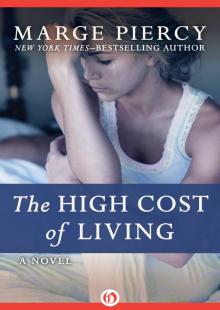 The High Cost of Living: A Novel
The High Cost of Living: A Novel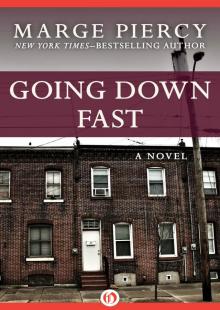 Going Down Fast: A Novel
Going Down Fast: A Novel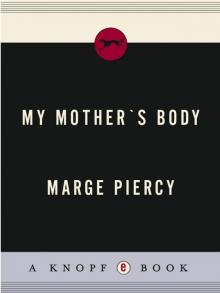 My Mother's Body
My Mother's Body Storm Tide
Storm Tide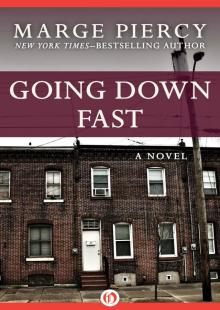 Going Down Fast
Going Down Fast The Third Child
The Third Child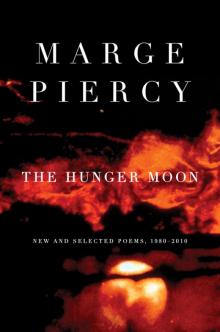 The Hunger Moon
The Hunger Moon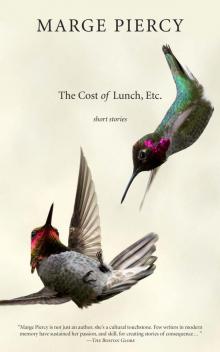 The Cost of Lunch, Etc.
The Cost of Lunch, Etc. Sex Wars
Sex Wars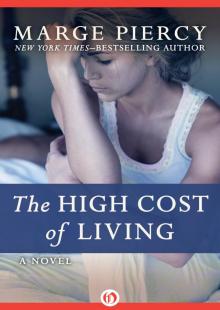 The High Cost of Living
The High Cost of Living Made in Detroit
Made in Detroit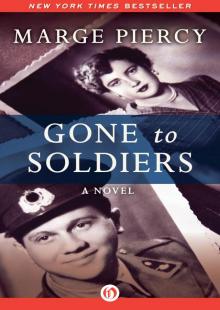 Gone to Soldiers
Gone to Soldiers